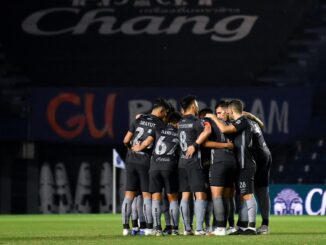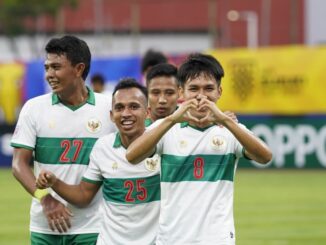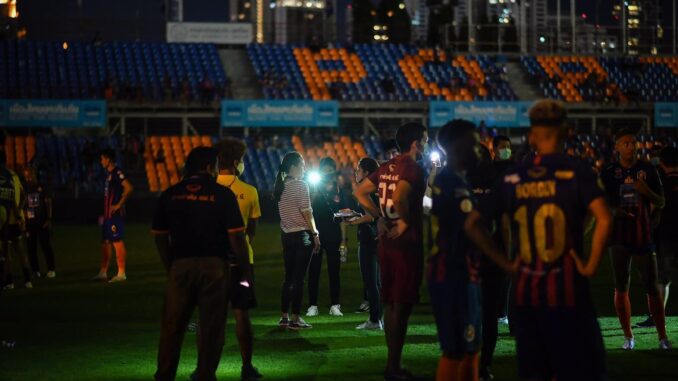
I was uncharacteristically early to Port’s match against Muangthong United this year. Straddled with the gratuitous and bothersome red tape of the ‘new normal,’ I needed to get in early to make sure I didn’t miss the derby.
Sitting in the near empty stadium, overflowing with the sound of speakers blasting music to almost nobody, I remember seeing flies circling above the press box. The way they would around a corpse, I distinctly remember thinking.
Turning to a friend, I remarked: “It’s a bad omen… for Port,” referring to my earlier prediction that the underperforming visitors would sneak away with all three points.
However, those words turned out to be more ominously prophetic than I could have ever imagined.
Suddenly, a commotion erupted at one corner of the ground just minutes before kickoff. Smoke was billowing from the generator beneath a floodlight, which would not turn on in time for the match. A haphazard assortment of guards, staff members and the clubs hierarchy frantically scrambled in the face of the impending catastrophe, but were unable to remedy the situation for an entire hour after kickoff was originally slated.
The club’s chairwoman, known to locals as “Madame Pang,” oversaw the arrival of the police, electricians and various other busybodies who ineffectually swooned over the generator while players and fans waited in complete darkness.
After realizing the futility of their efforts, the owner departed, followed in short order by both teams, leaving fans bewildered at the proceedings.
This incident would be a remarkable one on its own, but it was Port FC’s second floodlight failure of the season, with the earlier one occurring during the 88th minute of their match against Police Tero two home games prior.
The side were handed a devastating 2-0 loss from the first incident, and were eager to avoid a repeat. A lengthy appeals process allowed the club to escape with a rematch, but they were slapped with a stadium ban for the remainder of the first leg of the season.
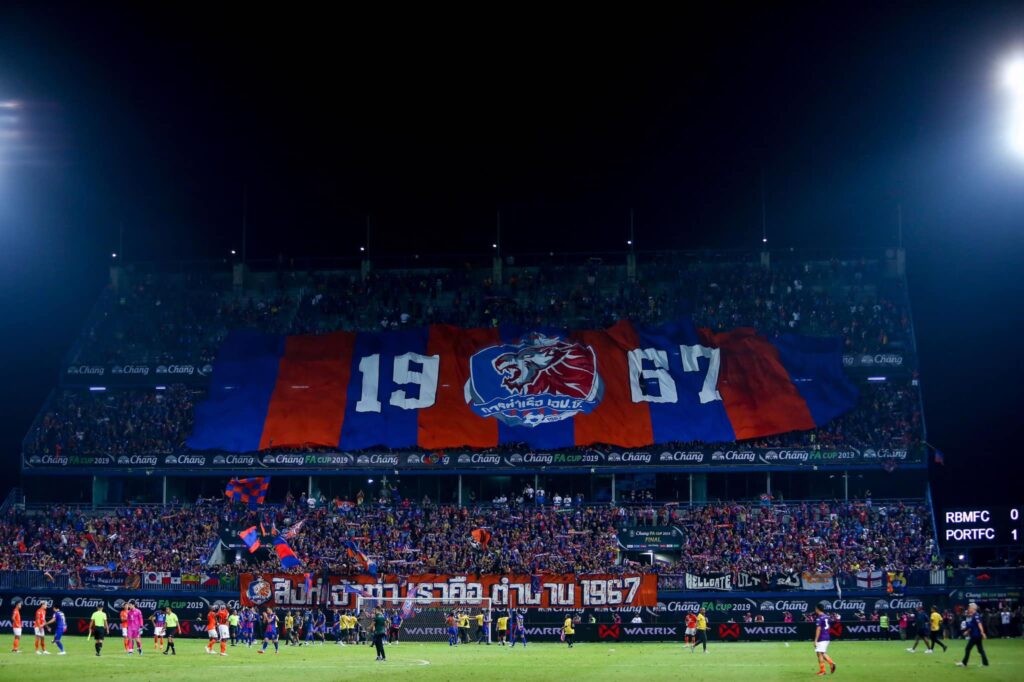
Opting out of paying a reported 100,000 Baht (USD$3300) per match at the nearby Rajamangala Stadium (far less than some of the side’s players earn), the ownership instead opted to play at BG Pathum United’s LEO Stadium, a full hour away from Port’s local Klongtoei district of Bangkok, even under moderate traffic conditions. For the club’s working class supporters, it was a crushing additional cost during a pandemic-induced recession.
It should be made very clear that the floodlight failure is not merely a freak accident, but rather a clear symptom and somewhat inevitable outcome of an ownership structure which has managed to both bring the club to the highest heights of the Thai scene, yet simultaneously leave them precariously dangling over a cliff.
As previously mentioned, the club is currently ‘owned’ by Nualphan Lamsam, commonly known as “Madame Pang,” the chairwoman of Muang Thai Life Insurance.
However, she acquired the club on an initial five-year lease from the Port Authority of Thailand – a state enterprise – which she has since extended for a further five years to run until 2024.
The specifics of the deal are unsurprisingly shrouded in mystery, but thus far it seems that her ownership of the club extends only to aspects related to the first team playing squad. The facilities and grounds are still in the hands of the Port Authority for the long term – as are the club’s youth teams, according to some reports.
It goes without saying how disappointing it is for an owner to neglect the most basic facilities of the club, and the current hierarchy certainly deserves some of the blame for the recent incidents. However, it is important to remember the doctrine of economics – that humans are rational, utility-maximising individuals that simply act in their best interest, especially where money is concerned.
Ignoring the development of the facilities is rational for Madame Pang’s crew, who don’t own it as an asset and will no longer need them when their boss loses interest. They were happy to turn the stadium famous for the atmosphere of its raucous pure-standing terraces into an all-seater to meet AFC Champions League requirements, but they have made no attempt to fix their rundown gym and dressing rooms.
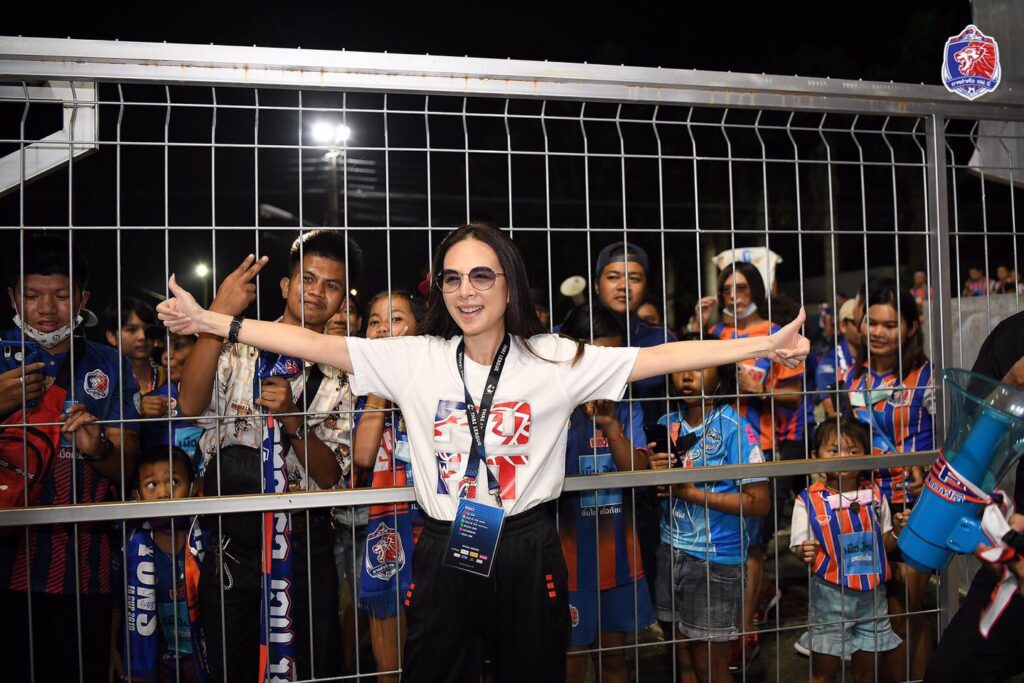
Leasing a club to owners willing to invest capital in short-term success may seem, on the face of it, an efficient and cost-saving exercise for both sides. The PAT is able to cut down on their expenses and balance their books, while Madame Pang is able to further project her popularity and endear herself to local supporters as an instrumental step in pursuing further ambitions.
It’s an arrangement that suffices for both sides, but leaves behind many stakeholders tied to the club – ranging from the supporters, who watch the occasionally stellar football against a backdrop of uncertainty and neglect, to the club’s young players, who know that they have no place in the first team.
However, more worryingly, this incident comes at the same time as the impending gentrification of Klongtoei threatens to turn the Port and famous wet market into yet more Bangkok high-rises.
The Port Authority is already preparing to move their operations to Chonburi, while a number of huge conglomerates circle above like vultures, waiting for their chance to strike. The government has touted plans to “relocate” (evict) the people of Klongtoei, with little or no regard for their deep ties to the community, the area, and Port FC.
Entrusting a football club to the awkward marriage of an apathetic state enterprise and a myopic corporate conglomerate, reducing the great past-time of the local community to a profit and loss sheet, was always likely to lead down this path.
However, it is not too late to change. The lessons from Port FC’s turbulent half-decade need to be taken on board, to ensure no club goes down the same path of facility neglect and fan mistreatment.
Lastly, and most importantly, there may just be time left to save the club. To keep one of Thailand’s few genuine community-based, working-class clubs for those to whom it means so much.
Main Photo: Port FC
Listen to Gian and Paul Murphy discuss the latest from the Thai League, including more in Port FC, on Episode 61 of The Asian Game podcast



